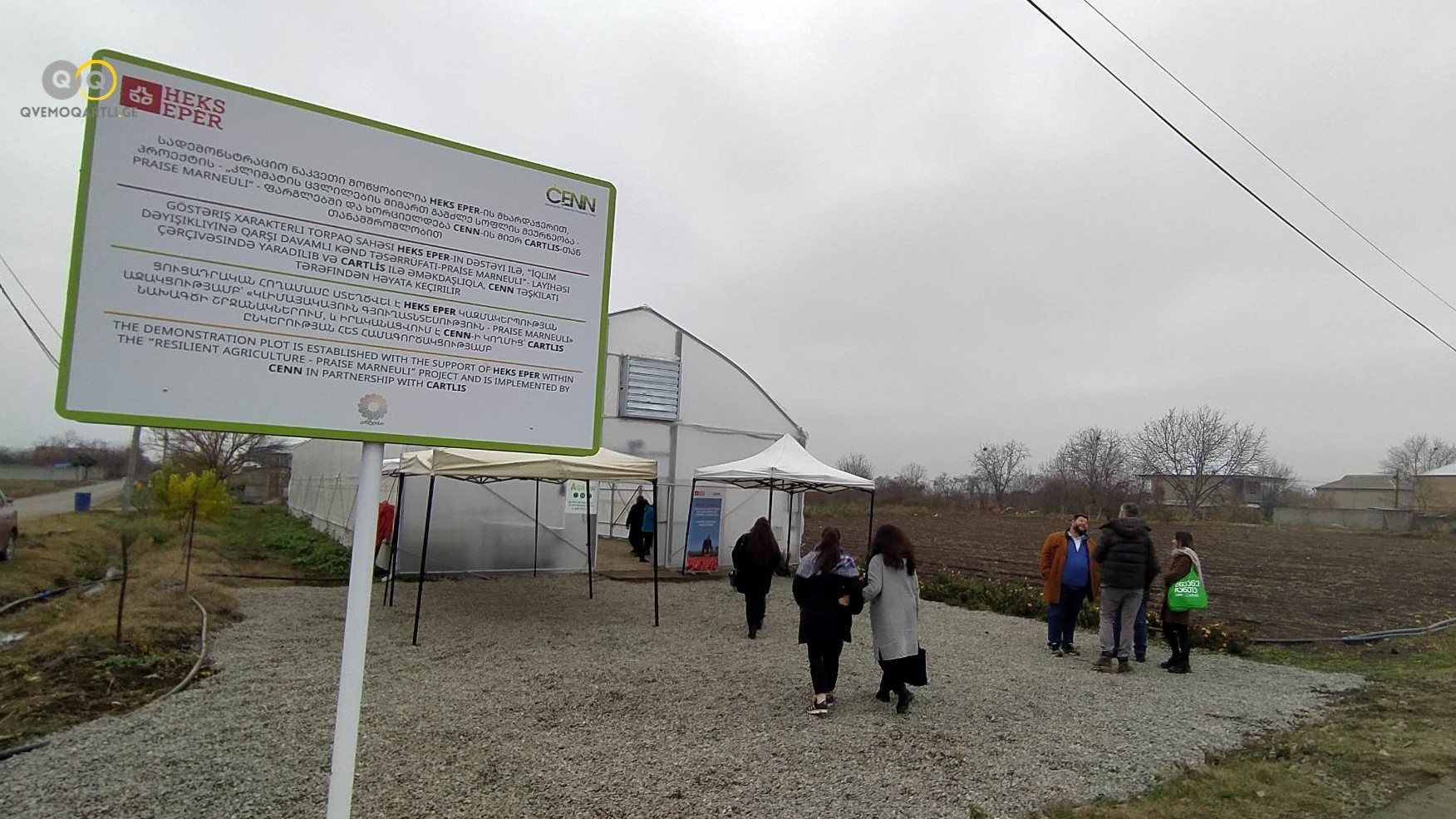A demonstration plot of the women’s cooperative was opened in Marneuli
A demonstration plot of “Mtsvane Maradis” greenhouse was opened in Marneuli municipality. The event was organized within the framework of the project “Agriculture Resilient to Climate Change – PRAISE MARNEULI”, which is implemented by the CENN organization with the financial support of HEKS-EPER.
The plot, consisting of two parts, is represented by a greenhouse equipped with modern standards designed for growing seedlings, as well as an open ground area, where several types of crops have already been grown.
Issues related to climate-smart farming were presented at the demonstration plot presentation. The conversation touched on the impact of climate change on agriculture.
In Marneuli Municipality, a greenhouse, a demonstration plot was created on the basis of the women’s cooperative “Mtsvane Maradis”, which is one of the examples of climate wise farming. The cooperative produces seedlings of various vegetable crops. In order to better manage the production process, various measures were implemented within the project.
One of the members of the cooperative, Naira Bolkvadze, notes that with the help of the project “Agriculture Resilient to Climate Change – PRAISE MARNEULI” they acquired knowledge about climate wise agriculture production. In addition, with the help of the project, they created a greenhouse that is fully equipped with modern technologies.
“Cooperative is very good, generally we women like to work in groups. We learned everything related to agriculture. The project helped us to introduce modern standards. Within the framework of this project, we already have a greenhouse, where we will grow 100 thousand seedlings and offer them to different customers, if it were not for this greenhouse, we would not have been able to grow this amount of seedlings”, says Naira Bolkvadze, a member of the cooperative.
Sandro Gujabidze, an agricultural expert of the organization CENN, notes that along with climate change, it is necessary to protect plants. In this process, the presence of greenhouses with modern technologies plays one of the main roles.
“In the conditions of climate change, it is necessary to protect our plants from climatic events, the intensity and frequency of which is expected to increase. Greenhouse farming is one of the methods that we can use to protect plants, since it is a direct physical barrier between external events and the plant. Especially when we produce vegetables and high-value products, there is a need to reduce climate-related risks.
It is very important to switch to such farms, since we want to respond to climate change with resistant varieties. These cultivars and seed material are usually expensive and therefore seedling production actually minimizes the loss of these seeds that we might have in direct seeding conditions.
Although the area of the greenhouse is not very large, it is about 300 square meters, this greenhouse will not only be able to meet the needs of 10 members of the cooperative during the season, but they will be able to sell these seedlings and generate additional income”, – Sandro Gujabidze, agriculture specialist.
Nana Janashia, executive director of the project implementing organization CENN, attended the opening event of the greenhouse demonstration plot. As he mentioned, along with the climate change, it is necessary to adapt agriculture.
“Two years ago, with the help of HEKS-EPER, we started implementing a project in Marneuli, Kvemo Kartli, the aim of which was to develop agriculture resistant to climate change. You know that the climate is changing and the whole world community is trying to make an economy adapted to climate change. The economy is being transformed as much as possible to adapt to this change.
Agriculture is very important for Kvemo Kartli and the water resources are already so scarce and the temperature has changed so much that it is difficult to adapt to this impact. So one of our goals was to create a cooperative in a region where there is a vulnerable community. Emphasis was placed on the women’s cooperative in the village of Maradis, which is working very actively”, – Nana Janashia, executive director of CENN.
At the end of the demonstration plot opening event, participants learned about the needs of rural women farmers, local challenges related to climate change. The guests of the event also took part in the preparation of nursery substrate and sowing of various vegetable crops.
Author: Nino Beridze
You can use the material only by referring to the site
